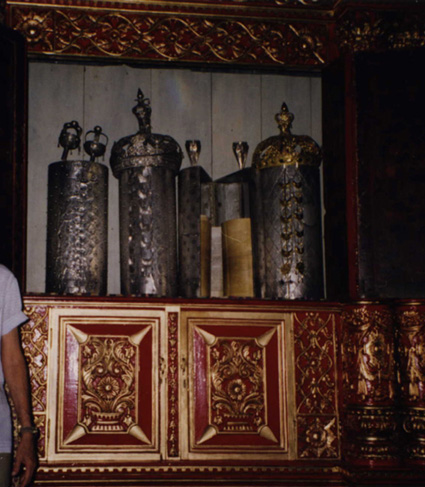|
|
COCHINI JEWS The second Jewish community of India is called ‘Cochini Jews’. They are called Cochini Jews because they lived in the city of Cochin in south India. But actually the first settlement of the Cochini Jews wasn’t in Cochin but a little north from Cochin in the town of Kudungallur (formly Cranganore). Like the Bene Israels, the arrival time of the first Cochini Jews isn’t clear. But one fact is sure about the Cochini Jews, that they weren’t a single emigration. At different times Jews arrived and settled in south India at Kudungallur. According to one version the first forefathers of the Cochini Jews arrived in India during the King Solomon’s period. King Solomon had commercial business with a kingdom probably existing in the present state of Kerala in south India. Other version claims that the Cochini Jews are from the Lost Tribes. Another version claims that the Cochini Jews arrived in India after they were exiled from Land of Israel by Nebuchadnezzar. Later on in the history Jews from Spain, arrived in Cochin. The Spanish Jews lived separately from the veteran Jews and considered them as Indian proselytes to Judaism. The Keralans take pride in the fact that the kingdoms of Kerala were world famous and merchants from around the world frequently visited Kerala, since the times of King Solomon and later on Romans, Greeks, Arabs, Chinese and others. Among the merchants, also arrived in Kerala many Jewish merchants and some of them settled in Kerala. The main center of the Jewish community in Kerala was at Kudungallur (referred to in English as Cranganore). The existence of the Jewish community in south India was known to other Jewish communities outside India and some other Jewish merchants also arrived in India. The Jewish merchants were influential community in their state and outside their state and were main reason for the prosperity in their kingdom. As a gratitude for their contribution to the kingdom, the ruler Sri Parkaran Iravi Vanmar gave to the head of the Jewish community Joseph Rabban the village of Anjuvannam and pronounced him the Prince of this village. These Jewish rulers had all the rights preserved to the ruling families of the Indian kingdoms. But till today there isn’t an agreement among the scholars on the exact date when this ‘Jewish kingdom’ was established. Different scholars give different dates to the establishment of this principality. Some claim it to be in the 4 century A. D. Others claim it to be at a much later period around10 century A. D. According to the Cochini Jews the ‘princely rights’ (written on copper plates and therefore called Copper Plates) were given to them in 379 A. D. Another fact not clear is : Which Cochini Jews received the ‘Copper Plates’? The Cochini Jews are divided in three groups. The biggest group is called ‘Meyuhassim’ (meaning ‘privileged’ in Hebrew) or Malabari Jews (Malabar is the name of the coast on which Kerala is situated). These Jews forefathers are considered to have arrived in India as merchants during the period of King Solomon. The second group is called ‘Pardesi’ (meaning ‘foreigner’ in some Indian languages). The Pardesi Jews are Jews who came to Kerala at different periods from different countries namely Egypt, Iraq, Syria, Iran, Spain and Germany. These two groups were merchants and had slaves who were converted to Judaism and later on released from their status as slaves and are called ‘Meshuhararim’ (meaning ‘released’ in Hebrew). These groups were sometimes referred to by colors. The ‘Privileged’ Jews were called ‘black’ Jews, the ‘Pardesi’ were called ‘white’ Jews. The ‘Pardesi’ Jews looked at the ‘Privileged’ Jews as impure Jews and as Jewish proselyte. Both these communities claim that the ‘prince’ was from their community. The Jewish principality survived till the 16th century A. D. In 1524 the Jews were attacked by Moorish Arabs because of the monopoly Jewish merchants had in some commodities. The Jews who were a principality with no real army deserted their principality and asked for shelter from the king of Cochin. The king received them in his kingdom and so was established the Jewish community of Cochin. The area where they lived and did business is even today called ‘Jew Town’. The Cochini Jews knew all of the Jewish traditions and preserved all Jewish traditions. They were particularly strict of Passover and didn’t even allow the non-Jews to touch the cooking utensils during this period. As stated before the Cochini Jews were very influential in their society. Numerically the Cochini Jews at their height were 3000 and that was in the 1940s. Of that the Pardesi were only 200. Today there are about 70 Jews in Cochin. |





